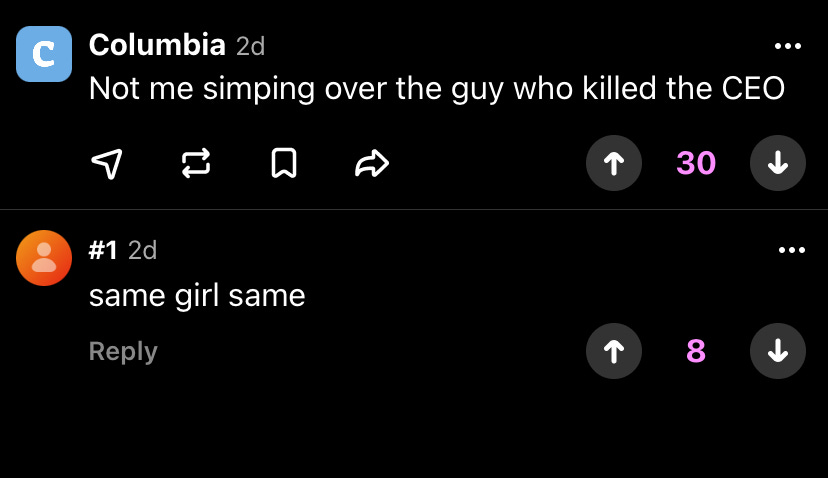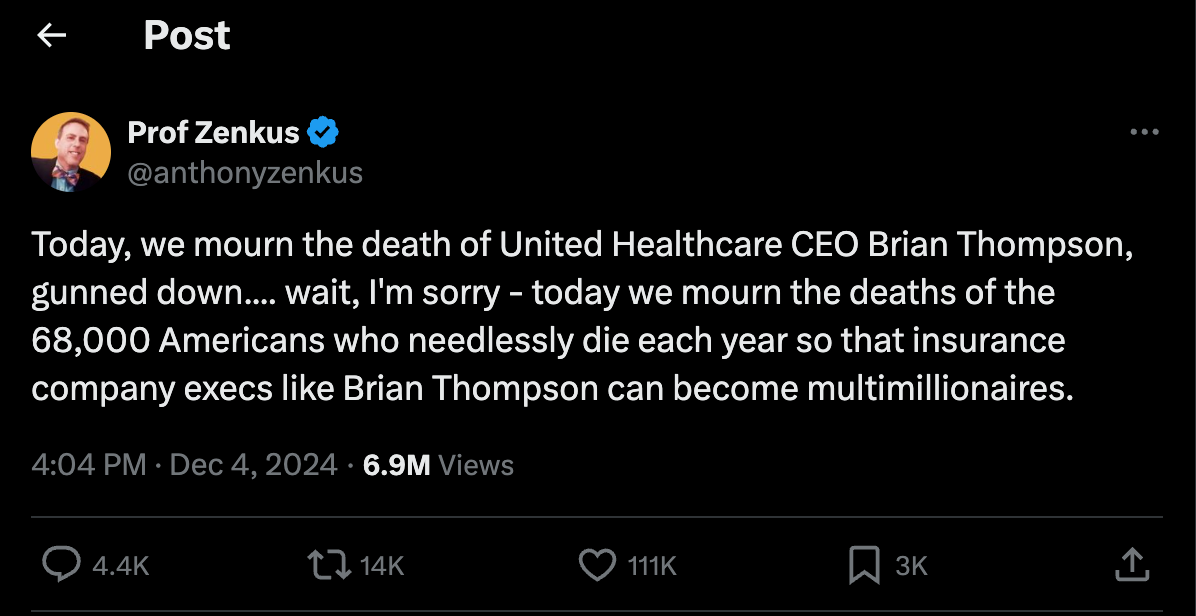A CEO Was Assassinated. Students and Faculty Cheered.
How the murder of Brian Thompson exposes a dangerous shift in campus activism
From the day Brian Thompson was murdered on Wednesday, December 4, Columbia students and faculty have been celebrating.
Not even the annual Tree Lighting ceremony last Thursday or the last day of classes this Monday elicited as much joy. Thompson, the CEO of insurance company UnitedHealthcare, was shot and killed on the streets of Manhattan while walking to his company’s investors’ conference. The suspected assailant, 26-year-old Luigi Mangione, arrived in Manhattan 10 days prior and stayed at the HI New York City Hostel, ten blocks south of Columbia.
Students and faculty alike flocked to social media to announce their support of the murder.
Barnard’s campus radio station WBAR reposted a stylized photo of the killer on their Instagram, which included sparkly pink text with words like “Thank You,” “100% Cute,” and “I love my princess.”
Sidechat, the anonymous school-only social media app, has been flooded with comments expressing infatuation with the suspected killer, escalating after his identity was revealed. “He’s so hot,” one user wrote. Another wrote, “mama i’m in love with a criminal.”
Anthony Zenkus, a professor at Columbia’s School of Social Work, shared his unapologetic apathy towards Thompson’s murder on X:
Today, we mourn the death of United Healthcare CEO Brian Thompson, gunned down.... wait, I'm sorry - today we mourn the deaths of the 68,000 Americans who needlessly die each year so that insurance company execs like Brian Thompson can become multimillionaires.
In his X bio, Zenkus says he is “Anti-violence,” a “Trauma expert,” and a “Commie.”
Last week in Washington Square Park, some New Yorkers held a “UnitedHealthcare CEO assassin lookalike competition” with eight contestants competing. Evidently inspired by the event, Columbia students attempted to organize their own “LUIGI MANGIONE LOOKALIKE CONTEST” this week (it did not end up occurring).
The joy following Brian Thompson’s death does not stem from a personal animosity towards the CEO, whose name was unknown to most before the shooting. Instead, it reflects a general frustration with the U.S. healthcare system, with many viewing Thompson as a symbol of its perceived evilness.
As someone who has spent countless hours this semester on the phone with insurance companies attempting to secure coverage for an essential medication, I understand this frustration all too well.
But there is a line—resorting to violence as a form of protest is morally indefensible. Worse, it sets a dangerous precedent that those who address social and economic problems with bullets will be celebrated as heroes.
Notably absent from X and Sidechat is any discussion of healthcare reform. Instead of thinking critically about what government policies might increase access to affordable medical care, students and faculty opted for performative outrage against “corporate greed.”
Few seem to care that Thompson is not responsible for establishing the U.S. healthcare system, nor is he personally to blame for the longstanding dysfunction of the insurance industry. Instead, Thompson’s death is treated as a human sacrifice for the sins of Big Healthcare.
Even more disturbing is the ease with which students and faculty stripped Brian Thompson of his humanity. Few on X or Sidechat seemed to care that the CEO leaves behind a wife and two sons, nor are they interested in the fact that he was not always a wealthy healthcare executive.
The reactions to Thompson’s murder fit into a larger, more troubling trend at Columbia: the growing acceptance of violence as a legitimate political tool.
Columbia has always had pride in its culture of activism, but there was once an understanding that advocacy would occur through discourse, not destruction. Now, students openly celebrate the October 7 terrorist attacks as an “unprecedented historic moment.” In July, many students took to social media to express how upset they were that Donald Trump was not successfully assassinated. Just this week, a Jewish student was punched in the face by a pro-Palestinian protestor just outside campus gates, and students on Sidechat were quick to justify the violence.
It’s sad that students from elite universities feel that senseless violence is necessary for social change. Mangione himself was a graduate of the University of Pennsylvania. In 2021, he left an online review of the domestic terrorist Ted Kaczynski’s (another Ivy League graduate) manifesto, sharing an online take he found “interesting”:
When all other forms of communication fail, violence is necessary to survive. You may not like his methods, but to see things from his perspective, it’s not terrorism, it’s war and revolution.
The murder of Brian Thompson is not a victory for anyone. It is a tragedy—and it will be an even larger one if the country’s brightest students cannot condemn such violence.
Oren Hartstein is a staff writer for Sundial and a freshman studying physics at Columbia College.








And what exactly did you expect from the students? They have been crying out for a policy to solve the problem of healthcare and yet you politicians sit on your comfortable seats of authority and do nothing about it. Them cheering this on is exactly what the country would do in response to your corrupt politics🤷♂️
Facile posturing. Excusable as immaturity--in the case of undergrads. But any faculty member joining in that self-indulgent posing needs to do some self-review.